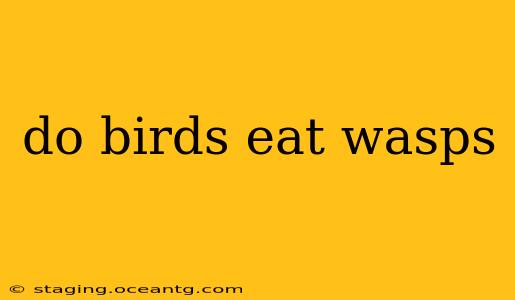Do Birds Eat Wasps? A Deep Dive into Avian Predation
Many birds include insects in their diet, and while wasps aren't a primary food source for most, several species actively hunt and consume them. The answer to "Do birds eat wasps?" is a resounding yes, but it's more nuanced than a simple yes or no. Let's explore the specifics.
What Kinds of Birds Eat Wasps?
Several bird species are known to prey on wasps, although the frequency varies depending on the bird species, wasp species, and the availability of other food sources. Some of the most common wasp-eating birds include:
- European Bee-eaters: These brightly colored birds are named for their preference for bees, but they also happily consume wasps. Their specialized beaks and digestive systems are well-equipped to handle the stingers.
- Woodpeckers: While primarily known for their insect-eating habits focused on wood-boring beetles, certain woodpecker species will opportunistically eat wasps they encounter while foraging.
- Flycatchers: Various flycatcher species are known to snatch wasps in mid-air, utilizing their aerial agility to catch flying insects.
- Shrikes: These predatory birds are known to impale their prey on thorns or barbed wire, a behavior also observed with wasps.
- Wrens: Smaller birds like wrens, while not specializing in wasps, may occasionally consume them.
How Do Birds Deal with Wasp Stings?
This is a crucial question. Wasp stings are painful, even for humans, so how do birds manage to eat them without getting stung? The answer is multifaceted:
- Thick Feathers: Many birds have thick feathers that provide a degree of protection against stings.
- Specialized Beaks: Some birds, like bee-eaters, have specialized beaks designed to efficiently crush the wasp's body, disabling the stinger before ingestion.
- Swift Handling: Many birds are remarkably quick in their handling of wasps, minimizing the time they are exposed to a potential sting.
- Natural Tolerance: Some birds may have a degree of natural tolerance to wasp venom, allowing them to withstand stings with minimal negative effects. Research in this area is still ongoing.
Do All Birds Eat Wasps?
No, certainly not all birds eat wasps. Many birds have diets specialized around seeds, fruits, nectar, or other insects. Wasp consumption is more of an opportunistic behavior for many species, supplementing their usual diet when readily available.
What About the Wasp's Venom?
The venom from a wasp sting is not necessarily harmful to all birds. Many birds' bodies are much more resistant to the venom than humans, and the quantity of venom in a single wasp is generally not enough to cause significant harm to a bird.
Are Wasps a Significant Part of a Bird's Diet?
While some birds actively hunt wasps, they are generally not a primary food source. Birds tend to focus on prey that is more abundant and easier to capture. Wasps are often a supplementary source of protein, filling in nutritional gaps or providing a convenient meal when other insects are scarce.
What Other Insects Do Birds Eat?
Birds have varied diets. Many consume a range of insects, including beetles, flies, grasshoppers, caterpillars, and more. The exact species consumed varies greatly depending on the bird's habitat and the available prey.
In conclusion, while not a staple food for most, many bird species do eat wasps. Their strategies for overcoming the threat of stings vary, but the practice is a testament to the adaptability and diverse feeding habits within the avian world.
